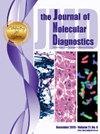New Resources to Identify Characterized DNA Reference Materials for Pharmacogenetic (PGx) and Human Leukocyte Antigen (HLA) Testing
IF 3.4
3区 医学
Q1 PATHOLOGY
引用次数: 0
Abstract
Regulations, accreditation standards, and professional guidance require laboratories to use reference materials for assay development, validation, quality control, and proficiency testing of clinical genetic tests. There are, however, few publicly available reference materials for most genetic tests. To address this issue, the CDC's Genetic Testing Reference Material Program (GeT-RM), the Coriell Institute for Medical Research, and the genetic testing community have conducted 19 studies, including nine for pharmacogenetic (PGx) and human leukocyte antigen (HLA) testing, to generate characterized, renewable, and publicly available DNA samples for use as reference materials. Because new PGx alleles are frequently identified, and allele designations change over time, many samples were reanalyzed for the same gene(s) in subsequent GeT-RM studies. These studies used more comprehensive and sensitive methods and panels that examined additional single-nucleotide variants and/or star alleles to expand and update the consensus genotypes. Up-to-date information is available in two newly established resources: the GeT-RM Consolidated PGx and HLA Table and the GeT-RM PGx Search Tool. These resources contain all available PGx and HLA genotypes for 363 publicly available samples characterized during nine GeT-RM PGx or HLA studies for 34 genes/loci in a consolidated and searchable format.
基因检测参考物质(GeT-RM)程序PGx搜索工具和GeT-RM整合PGx和HLA表:鉴定鉴定PGx和HLA检测特征DNA参考物质的新资源
法规、认证标准和专业指导要求实验室使用参考材料进行分析开发、验证、质量控制和临床基因检测的熟练程度测试。然而,对于大多数基因检测,很少有公开可用的参考材料。为了解决这个问题,疾病控制和预防中心的基因检测参考物质项目(gem - rm)、科里尔医学研究所和基因检测社区进行了19项研究,包括9项药物遗传学(PGx)和人类白细胞抗原(HLA)测试,以创建特征、可再生和公开可用的DNA样本作为参考物质。由于新的PGx等位基因经常被发现,并且等位基因的名称随着时间的推移而改变,因此在随后的GeT-RM研究中,对许多样本进行了相同基因的重新分析。这些研究使用了更全面和敏感的方法和小组来检测额外的单核苷酸变异(snv)和/或星型等位基因,以扩大和更新共识基因型。最新的信息可在两个新建立的资源:GeT-RM整合PGx和HLA表和GeT-RM PGx搜索工具。这些资源以统一和可搜索的格式包含了9个GeT-RM PGx或HLA研究中34个基因/位点的363个公开样本的所有可用PGx和HLA基因型。
本文章由计算机程序翻译,如有差异,请以英文原文为准。
求助全文
约1分钟内获得全文
求助全文
来源期刊
CiteScore
8.10
自引率
2.40%
发文量
143
审稿时长
43 days
期刊介绍:
The Journal of Molecular Diagnostics, the official publication of the Association for Molecular Pathology (AMP), co-owned by the American Society for Investigative Pathology (ASIP), seeks to publish high quality original papers on scientific advances in the translation and validation of molecular discoveries in medicine into the clinical diagnostic setting, and the description and application of technological advances in the field of molecular diagnostic medicine. The editors welcome for review articles that contain: novel discoveries or clinicopathologic correlations including studies in oncology, infectious diseases, inherited diseases, predisposition to disease, clinical informatics, or the description of polymorphisms linked to disease states or normal variations; the application of diagnostic methodologies in clinical trials; or the development of new or improved molecular methods which may be applied to diagnosis or monitoring of disease or disease predisposition.

 求助内容:
求助内容: 应助结果提醒方式:
应助结果提醒方式:


